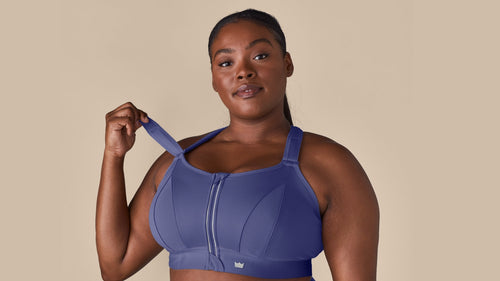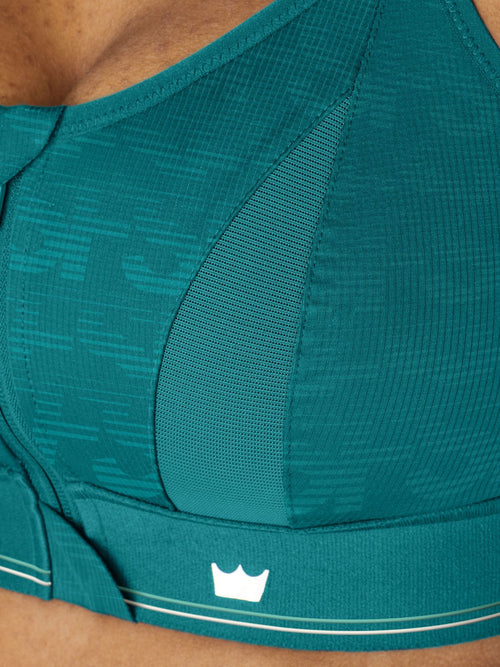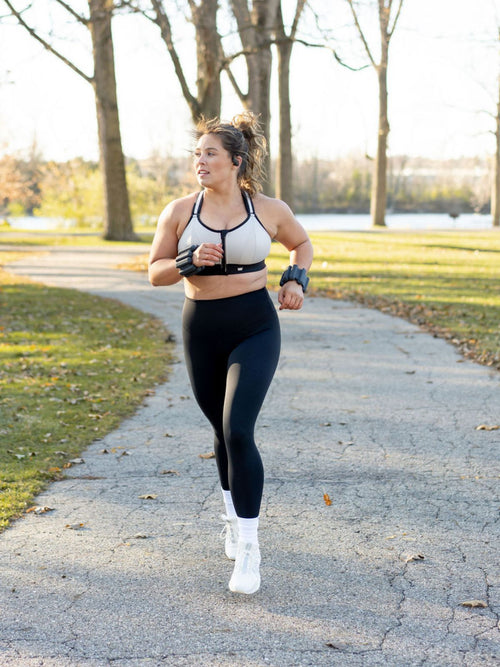Free shipping on U.S. orders over $99 Shop Now
11 Reasons You're Bloated and What to Do About It
Have you ever finished an amazing meal only to look down and see your stomach has doubled in size, and even worse, the painful feeling like it's tripled in size? You're not alone - belly bloating happens to all of us and the most frustrating part is finding bloating relief.
While there are several ways to get relief, such as walking after a meal or taking a probiotic supplement, the challenge lies in figuring out the root cause. There's certainly no replacement for a professional medical opinion on the matter, but it's helpful to know some of the usual triggers.
Here are 11 of the most common causes of belly-bloating:
- Eating too much
- Eating quickly
- High salt intake
- Cruciferous vegetables
- Constipation
- Drinking through straws
- Artificial sweeteners
- Bubbly beverages
- Inactivity
- Eating too late
- Underlying issues
Once you learn more about the causes, you can start working on treatments. Keep reading to understand more about each of the common causes of bloating, and how to get relief.

1. You're Eating Too Much
Overeating is one of the most common reasons for bloating, but it can be difficult to curb the behavior. After all, who doesn't love over-indulging in delicious? However, remember that the more food you eat, the worse you'll feel.
How To Eat the Right Amount:
Moderation is key. A few treats here and there won’t hurt you, but make sure you’re not overindulging all the time. Make sure your plate isn’t too full and that you’re limiting the amount of post-dinner sweets.
2. You're Eating Too Quickly
Ravenous hunger or short lunch breaks can make you feel pressured to eat fast. While you might not notice it at first, eating quickly can cause delayed abdominal bloating. From swallowing air that produces gas to not properly chewing your food, which taxes your digestive system, the speed at which you consume food can profoundly affect bloating.
Practice Mindful Eating:
Try to slow down when you eat to give your digestive system time to process everything - this means carving out at least 20 minutes per meal. Sit down and eat slowly to give your body time to digest - standing or moving while you eat can contribute to bloating. Another tip to consider is eating smaller, but more frequent meals.

3. Watch Your Salt Intake
Although salty potato chips might sound appetizing, it's best to avoid high-sodium foods. When you eat too much salt, your body retains water which then makes your stomach feel bloated.
Less Sodium, More Water:
Water is essential for our body to function but many of us don't drink enough throughout the day. If you're looking to cut down on salt, try flavoring your food with spices, herbs, and salt-free blends. This way, you can still enjoy the taste of your favorite dishes without all the sodium!

4. You're Having Too Much of a Good Thing - Raw Cruciferous Greens
Cruciferous greens like kale, Brussels sprouts, and broccoli are healthy for you - but if you love eating them raw, there's something you should know. These greens contain a lot of hard-to-break-down fiber as well as indigestible sugar called raffinose which can cause gas and puffiness when consumed raw.
Prepare Them Differently or Find An Alternative:
Cutting down on raw cruciferous vegetables will help reduce the bloat, but the key word here is raw. If you don’t want to give up your favorite vegetables, then try steaming or baking them instead - this will soften the fiber, giving you the nutrients without all the gas. So during your next kale hankering, try SHEFIT's kale chips recipe instead.

5. You Might Be Constipated
You could probably guess that constipation and bloating go hand in hand. Constipation causes your stool to remain in the intestines, accompanied by fewer bowel movements and leaving you with stomach pain, discomfort, gas & of course, bloating. Constipation and even chronic constipation are common causes of abdominal bloating.
Just like bloating, there are many reasons you could have constipation, such as a diet low in fiber, not drinking enough water, not getting enough exercise/movement, and stress.
Eat More Fiber and Stay Hydrated
Try to eat a balanced, healthy diet with plenty of fiber, and make sure you stay hydrated. You should start by aiming for 22 to 34 grams of fiber per day. Consuming more oats, green leafy vegetables, and beans can help you reach that goal.
You can also try fiber supplements if you're not getting enough from food. Make sure you're drinking water as well because that can get your bowels moving. Along with a healthy diet, make sure you’re getting plenty of exercise too – at least 3 times a week

6. You're Always Drinking Through a Straw
Sure, a straw might make your beverage more fun or even easier to drink but it’s a cause of bloating as it causes you to gulp air down. Swallowing more air than you need because you decided to use a straw may sound ridiculous, but each time you swallow, gas enters your stomach and can go down into your small intestines.
When gas accumulates in your abdominal cavity and small intestine it can cause abdominal bloating and stomach pain. Intestinal gas can be extremely painful too.
And it doesn’t matter how slowly or deeply you sip; either way, you’re taking in air and it’s next to impossible to avoid. So try to avoid using a straw whenever possible and sip your drink from the rim of the glass instead.
Ditch the Straw
This one's too obvious - just avoid using a straw whenever you can. To make this recommendation a little more helpful, click here for a fantastic smoothie recipe to help you get rid of bloating. Just don't use a straw with it. 
7. Too Many Artificial Sweeteners in Your Diet
If you're trying to lower your sugar intake to fight weight gain or simply live a healthier life, artificial sweeteners can help curb your cravings for something sweet and offset the higher-calorie option of sugar. Unfortunately, consuming sweeteners can cause bloating.
Artificial sugars like aspartame and sucralose are found in diet drinks, chewing gum, and even hard candies. These artificial sugars aren’t easily digested (or even at all) and end up hanging out in your stomach for a lot longer than they should.
Substitute Stevia for Artificial Sweeteners :
You might need to look at food labels or keep a food diary to track what you've been nourishing your body with, as it may be a specific artificial sweetener exacerbating your bloating feeling. You could also try using stevia instead. This no-calorie sugar alternative is 200 times sweeter than sugar and the FDA says there are more than 90 studies supporting its safety.

8. You Love Bubbly Beverages
Sparkling water, seltzer, and sodas contain carbonation. The hundreds or thousands of bubbles they create can increase the amount of gas in your stomach, which can make you feel bloated.
Drinking these beverages with a straw can make your symptoms even worse.
Cut Back and Add Ice:
You should avoid carbonated beverages whenever you can and stick to water or flavored drinks that don't have carbonation if you don't want to experience bloating.
If you really can’t live without your soda fix then try to at least cut down on the carbonation by leaving it open for a few hours before you drink it. Adding ice cubes will also help to reduce carbonation (and the inevitable belly bloat).

9. You Don't Move Enough
A lack of movement can be blamed for a lot of health problems, including abdominal bloating. While it might not be one of the main causes of bloating, it does seem to reduce symptoms.
One study showed that people tended to experience less bloating after a meal if they did some light exercise.
Just by walking 10 to 15 minutes after eating, the study showed a significant reduction in pain and bloating. You don't need to do a workout every time you eat, but you should move a little bit when you're done.
Add More Cardio to Your Life:
The best thing you can do is walk after eating and get 15-20 minutes of exercise in a day. It may not cure bloating, but regular exercise is healthy and promotes weight loss. You can do anything from taking a long walk to swimming laps in a pool. If you want to do resistance training, core strengthening workouts can help reduce your symptoms.
A core strengthening exercise help reduce symptoms of bloating, and if you're looking for a way to have some fun with it, check out SHEFIT's 3 slider exercises.

10. You're Eating Too Late
If you eat a large meal and then lie down within an hour or two, you're more likely to experience stomach bloating in the morning. Lying down after eating can impair your digestion and prevents your body from breaking down food effectively.
Plus, the late-night fridge binge is a common mistake for weight loss journies - so if you're also feeling bloated and trying to lose weight, you now have two reasons to stop eating so close to bedtime.
Schedule Your Last Meal of the Day:
To avoid bloating at night, have dinner 3-4 hours before bed and keep your body moving throughout the evening. If you can't have an early dinner, try eating smaller portions and drinking peppermint tea - this little drink is a game-changer.

11. You're Ignoring An Underlying Issue
You may have something else going on that needs to be looked at, such as eating foods that are giving you excessive bloating without even knowing it. Here are several that are worth taking to the time with your doctor to discuss:
Irritable Bowel Syndrome (IBS)
The causes of irritable bowel syndrome are still somewhat of a mystery. To a doctor, your digestive system might be perfectly healthy. Still, the smooth muscle in your intestines might not be working properly, or your immune system could be dysfunctional.
If you have chronic bloating, your first step should be to see a doctor. Many people with IBS have bloating, among other symptoms. Women with IBS are even more likely to have bloating. If your problems get worse as the day goes on it's a sign that IBS could be the underlying cause.
There's no set path or cure for people with IBS to reduce bloating, but there are some lifestyle changes that may help decrease the bloating.
Food Intolerance
Some common food intolerances contribute to bloating, such as lactose intolerance or problems digesting histamines. Eating something your intestines can't digest properly can cause gas or diarrhea, which leads to bloating. Keep in mind that there's a difference between food allergies and intolerance.
An allergy indicates that your immune system is responding to the food, which causes symptoms like hives and swelling. Intolerance is different because it's not caused by an immune reaction.
An easy way to test whether or not these intolerances are causing bloating is to eliminate them from your diet briefly. Of course, if you have that level of concern, you should see your physician.
Celiac Disease
Another type of food intolerance is celiac disease. People with celiac have trouble digesting gluten, which prompts an immune response in the intestines. This immune response damages the small intestine over time.
To treat your symptoms, you should try eliminating foods with gluten from your diet. Wheat products and whole grains can contain gluten, as well as some medications and even makeup. Your doctor can prescribe medications to treat any symptoms related to your underlying issues.
Celiac Vs. Gluten Intolerance
Celiac is different from gluten intolerance because it involves an immune response. Both can cause abdominal bloating and stomach pain, but only Celiac damages the small intestine.
If you get abdominal pain and bloating after eating wheat products or taking medication that contains gluten, you should see a medical professional to differentiate between gluten intolerance and Celiac.
Small Intestinal Bacterial Overgrowth
A disturbance in the bacteria that live in your gut can make you feel bloated. A healthy gut requires good bacteria, which help break down food among other things. Problems occur when bad bacteria move in and start outcompeting the good bacteria.
One of the symptoms of small intestinal bacterial overgrowth (SIBO) is abdominal bloating. Other common symptoms include gas, nausea, and indigestion. SIBO can be caused by underlying problems such as improper removal of waste from the small intestine, or too little stomach acid.
Medications, including certain antibiotics, can disrupt gut bacteria. Something may be physically wrong with your intestines, such as bowel obstructions or abdominal adhesions. Certain foods can contribute to SIBO as well, such as sugary snacks, fruits, dairy, or grains.
Even though antibiotics could contribute to SIBO, a doctor might prescribe different antibiotics to set your gut bacteria back to normal amounts. Your doctor will also make sure to treat any underlying causes.
Fighting Abdominal Bloating
There are many potential causes of bloating, some are benign while others require a doctor to properly diagnose. Regardless of the cause, there is generally an awful feeling of discomfort that's worth addressing.
Each of the potential causes of bloating has a different treatment path, which can be frustrating if you don't fully know the root cause.
Unless advised otherwise by your physician, there are generally some basic lifestyle changes that maybe improve your symptoms. Regular exercise, eating right (portions, speed, and specific foods), and avoiding carbonated drinks can go a long way in getting relief.
Photo credit: Bigstock, Pixabay, Google, Flickr





















